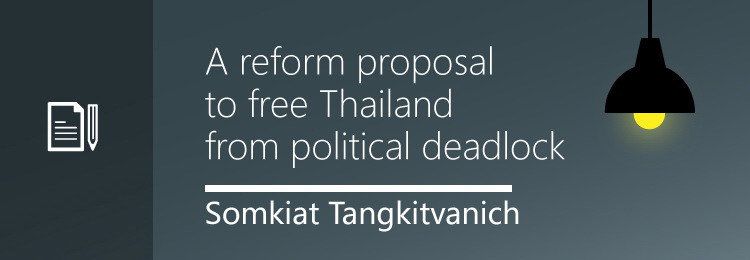Thai politics is once again at a dead end. The Democrat Party decided to boycott the upcoming Feb 2 general election. The anti-government People’s Democratic Reform Committee (PDRC) vowed to stop it at all costs. With the Bangkok shutdown operation set to begin next week, tensions could spiral into violence.
Though the government said it would proceed with reform after the election, the conflicting sides and many citizens lack faith in that reform. If the election finally takes place, the anti-government movement is likely to continue its protests, making it hard for the new administration to govern the country.
On the other hand, cancelling the election as the PDRC demand would not be accepted by pro-government supporters and democratic-minded citizens.
In my opinion, the solution to the political conflict requires major national reforms conducted in a democratic manner.
Though both the government and the PDRC seem to agree that Thailand needs reform, they disagree on which should come first, the election or the reform.
I believe both stances are problematic as they aim at seizing political advantage more than aiming to create real reforms through cooperation.
The government’s reform promise is seen as only a public-relations move to dampen political pressure without the intention to undertake real reform.
Meanwhile, the previous Democrat-led government did not show any political will in pushing reform proposed by the two national reform committees appointed by Abhisit Vejjajiva and led by former prime minister Anand Panyarachun and civic leader Dr Prawase Wasi.
The Yingluck government also paid no attention to reform recommendations from the committees. There have been no tangible developments from the reform council set by the Yingluck government.
This trend suggests that ruling governments have no incentive to reform. The PDRC’s demand for reform, however, can be seen as an excuse to create a political vacuum. Also, many of the reform recommendations cannot be accomplished in a short period of time. Besides, they exclude other stakeholders from taking part in the reform process. This makes the PDRC’s reform for “absolute democracy” just anti-democratic.
In my opinion, Thailand needs real reform immediately, but it must take place under democratic rules.
I believe that reform could succeed only under the following conditions:
1) all relevant parties must be included in the process, although the reform process must not be dominated by any party;
2) a mechanism to ensure the parties in conflict would accept the reform blueprint, and
3) a mechanism to at least partially ensure the government would carry out the recommended reform.
I offer here an example of a plan for reform which contains the elements mentioned above.
First, the reform process must start prior to the election because once a government is secured in power, it has no incentive to conduct reform.
I agree with the recommendation of the seven private sector organisations that urged the government to establish a reform body immediately, prior to the election.
This body should have legal status to ensure that it continues to exist after the election. Such a body would help establish public trust that reform would actually happen after the election.
Second, the reform body should be a “reform committee”, not too big in size that it becomes a “reform assembly”. For example, the body might be limited to 30 people; one-third could be recommended by the ruling parties, one-third by the opposition, and one-third could be representatives from different sectors in society (such as academia, business, agriculture, civil society, or labour), who could be the “trusted neutral parties”.
The candidates for “trusted neutral parties” must be accepted by both the government and the parties in conflict. This arrangement would include parties in conflict without letting any side dominate the process.
The reform committee should also create a mechanism to work with reform-minded civic groups and promote public participation to make the reform process more broad-based.
Third, the committee’s recommendations for the government should require just a little more than a majority such as 60% (18 out of 30 votes) to ensure the recommendations are accepted by the opposite side and the “neutral parties” as well.
This proportion is also not too high to make reform difficult, as it prevents recommendations from being blocked too easily.
Fourth, the reform committee should limit the scope of its recommendations to no more than four or five significant issues that drive the current political conflicts and which require immediate attention.
These issues might include rules related to acquiring state power, checks and balances on state power, corruption, populism and fiscal discipline, or justice issues relevant to the current conflict.
This does not mean that other issues such as education reform, inequality reduction, or the broader justice system are irrelevant, but only that these issues need continuous and long-term measures and should be carried out by an elected government under normal circumstances.
Fifth, the committee should offer reform recommendations along with timeframes to the government, starting with ones having high consensus and practical plans. The recommendations should provide a deadline as well, to provide tangible results for citizens. The committee could recommend more complex reforms afterwards.
Sixth, besides recommending reforms to the government, the committee should monitor whether the government is carrying out reform as recommended and within the timeframe. If the government does not carry out reform as recommended or shows an intent to delay or shun reform, the committee should have a duty to advise the government to “punish itself” by dissolving the parliament and holding a new election. This would create incentives for the government to carry out reform unless it wants to face public pressure.
These reform ideas are just examples I would like society to consider. I do not see any way out of the conflict unless every side, including the government and the opposition, commits to a credible reform process.
____________________________________________________
First published: Bangkok Post, January 10, 2014


